Harry Potter and the Goblet of Fire Review
Review by Christopher G. Nuttall
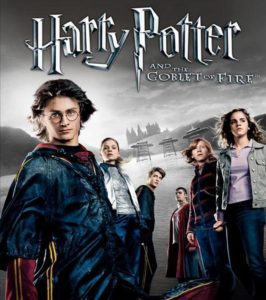
In one sense, Goblet of Fire represents the high point of the Harry Potter series. It not only continued the shift from single-books to an episodic series and fleshed out elements of the Wizarding World, it also resurrected Lord Voldemort and kicked off the Second Wizarding War. The three years between Goblet of Fire and Order of the Phoenix also saw the first great flourish of Harry Potter fan-fiction, with literally millions of writers producing billions of versions of the next few books. (Rowling deserves full credit for encouraging writers to write.) But, at the same time, Goblet of Fire has its problems – some deliberate, some accidental – that make it harder to re-read. It isn’t as tightly-plotted as the last three books and it shows.
 After spending a few weeks at his aunt and uncle’s house, Harry (and Ron and Hermione) attend the international quiddich cup. The sporting event is disrupted by a bunch of thugs – the Death Eaters, the remnants of Voldemort’s old army – who scatter when they see the Dark Mark over the field. Going back to Hogwarts, Harry and his friends are told that the school will be hosting an international contest of its own – the Triwizard Tournament. Three schools will take part, with one contestant from each school. He also meets Mad-Eye Moody, the new DADA teacher. For once, it looks like Dumbledore actually made a good choice.
After spending a few weeks at his aunt and uncle’s house, Harry (and Ron and Hermione) attend the international quiddich cup. The sporting event is disrupted by a bunch of thugs – the Death Eaters, the remnants of Voldemort’s old army – who scatter when they see the Dark Mark over the field. Going back to Hogwarts, Harry and his friends are told that the school will be hosting an international contest of its own – the Triwizard Tournament. Three schools will take part, with one contestant from each school. He also meets Mad-Eye Moody, the new DADA teacher. For once, it looks like Dumbledore actually made a good choice.
Harry is too young to compete in the contest, but – after the first three contestants are chosen – Harry’s name comes out too. Apparently, he has to take part anyway – magically-binding contact, etc. This provokes a brief split with Ron, who is (understandably) jealous of Harry – once again – getting everything. Harry is forced to take part in three challenges, the third ending with him being transported to a graveyard … where he comes face-to-face, once again, with Peter Pettigrew. Pettigrew uses Harry’s blood to resurrect Lord Voldemort, who intends to kill Harry on the spot, but Harry is quick enough to escape. Back home, he discovers that Moody was replaced by a Death Eater spy and that the Ministry of Magic refuses to believe that Voldemort has returned. Dumbledore vows to fight anyway …
… And, once again, Harry is returned to his aunt and uncle.
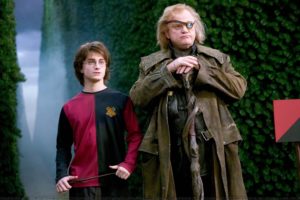 It’s easy to see why Goblet of Fire is popular, despite its flaws. Harry faces three challenges that should have daunted an older wizard, but he is clever enough (with a little help from his friends) to find ways to overcome them. It also expands the Wizarding World, although – once again – it’s hard to see how such a relatively small population can support a full-sized sports contest. (Rowling’s numbers are quite poor.) And it brings back the threat, the dark wizard who will dominate the remainder of the series.
It’s easy to see why Goblet of Fire is popular, despite its flaws. Harry faces three challenges that should have daunted an older wizard, but he is clever enough (with a little help from his friends) to find ways to overcome them. It also expands the Wizarding World, although – once again – it’s hard to see how such a relatively small population can support a full-sized sports contest. (Rowling’s numbers are quite poor.) And it brings back the threat, the dark wizard who will dominate the remainder of the series.
It also expands the characterisation of many other characters, particularly Ron. It’s easy to see why Ron would be jealous of Harry, even though – as he comes to realise – being entered in a life-threatening tournament isn’t exactly a good thing. Poverty wears on Ron, as it does on his brothers – the pitiful robes his mother gave him for the Yule Ball can’t have helped – and being forced to watch Harry get yet another honour couldn’t have been easy. But it’s good to see that he overcomes it, even though he was going through the worst of puberty at the time.
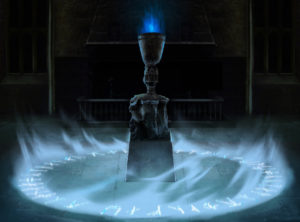 This does raise the question of why Harry could be forced to take part in the contest in the first place, something that thousands of writers have sought to explain away by blaming everything on Dumbledore deliberately allowing it to happen. There’s no logical reason why, if Harry can be thrust into a life-or-death situation, Voldemort can’t be magically bound not to do evil. This is a plot hole that Rowling never chose to acknowledge.
This does raise the question of why Harry could be forced to take part in the contest in the first place, something that thousands of writers have sought to explain away by blaming everything on Dumbledore deliberately allowing it to happen. There’s no logical reason why, if Harry can be thrust into a life-or-death situation, Voldemort can’t be magically bound not to do evil. This is a plot hole that Rowling never chose to acknowledge.
My personal head-canon is that Dumbledore and the other headmasters were bound by the contract, not the students. They were sworn to allow whoever was selected to compete (even if the person selected was a poor representative.) Dumbledore was trapped the moment Harry’s name came out of the goblet … and, given what we learn about him later in the series, it wouldn’t be out of character for him not to admit to it. Therefore, from Ron’s POV, Harry was not only lying … he was telling an insultingly obvious lie. And, given how little Harry knows about the Wizarding World, he had no way to know it.
Ron is not the only character who has an expanded role. Fred, George and Percy all show their determination to make money and build a career. The cracks in the Weasley Family are fast becoming obvious, although Rowling didn’t take this as far as I thought she would. I have noted before that I don’t like the twins, but here they’re worse. Dudley is a bullying ass – there’s no denying it – but Fred and George give him a magical candy that could have easily choked him to death. What are his parents going to be able to do to stop it? The casual disdain and arrogance shown by most wizards towards muggles is on full display. The line between Fred and George and the Death Eaters is thinner than most people want to believe.
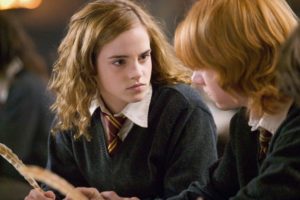 Hermione – too – has a great deal of character development, although not all of it is to her credit. Discovering that Hogwarts relies on House Elf labour – slave labour, in her words – Hermione sets out to stridently campaign for their freedom. This results in her becoming a laughing stock, although no one points out that Hermione, as a beneficiary of House Elf labour, is – at best – an accessory after the fact. Quite apart from the fact that the only people who join the unfortunately-named SPEW are people she bullied into joining, she makes no attempt to understand the elves or realise that they might be happy in their role. She’s no better than the average SJW, who sees presumed injustice without bothering to analyse the root cause. Unsurprisingly, Hermione causes the elves more problems than she solves.
Hermione – too – has a great deal of character development, although not all of it is to her credit. Discovering that Hogwarts relies on House Elf labour – slave labour, in her words – Hermione sets out to stridently campaign for their freedom. This results in her becoming a laughing stock, although no one points out that Hermione, as a beneficiary of House Elf labour, is – at best – an accessory after the fact. Quite apart from the fact that the only people who join the unfortunately-named SPEW are people she bullied into joining, she makes no attempt to understand the elves or realise that they might be happy in their role. She’s no better than the average SJW, who sees presumed injustice without bothering to analyse the root cause. Unsurprisingly, Hermione causes the elves more problems than she solves.
Snape is also given an expanded role, although he plays less of a direct role in events than we might expect. It is revealed, for the first time, that Snape was actually a Death Eater … who switched sides and spied on Voldemort for Dumbledore. This does nothing for Harry’s feelings towards the Potions Master, but worked wonders for fan fiction writers. Snape as Byronic Hero became a trend for a very long time.
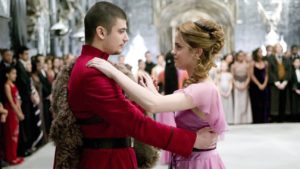 Goblet of Fire also touches on school romance, although not to the extent of millions of fan fictions. Harry tries to ask out two girls, only to fall flat on his face; Ron is crushing badly on Hermione, but is unable to put it into words. And Hermione is asked to go to the Yule Ball with Krum, a world-famous sports star. (Krum may sound stupid, to our ears, but English is probably his third language.) As always, teenage romance in books is cringe-worthy because teenage romance is cringe-worthy. I know that shipping was already a thing by the time Goblet of Fire was written, but I cannot help wishing that Rowling had left it out. I don’t read books for the romance.
Goblet of Fire also touches on school romance, although not to the extent of millions of fan fictions. Harry tries to ask out two girls, only to fall flat on his face; Ron is crushing badly on Hermione, but is unable to put it into words. And Hermione is asked to go to the Yule Ball with Krum, a world-famous sports star. (Krum may sound stupid, to our ears, but English is probably his third language.) As always, teenage romance in books is cringe-worthy because teenage romance is cringe-worthy. I know that shipping was already a thing by the time Goblet of Fire was written, but I cannot help wishing that Rowling had left it out. I don’t read books for the romance.
Rowling also develops the background plot to some extent, although we see less of it than we do in the earlier books. It’s clear that Lucius Malfoy – who would have known that his old master was coming back, just as Snape did – has been working hard to build up his influence and power, hoping to avoid punishment for deserting Voldemort after his first defeat. (Unlike most of the Death Eaters, Lucius has a great deal to lose.) We saw hints of this as far back as Chamber of Secrets, but now his plotting comes out into the open. Lucius ensured that the Ministry of Magic would be unwilling to admit that Voldemort had returned, giving the Dark Lord an immense tactical advantage.
The weaknesses of Goblet of Fire, however, are striking. Quite apart from the issue of Harry being forced to compete in the tournament, there are a handful of other plot holes. It is never explained how the fake Moody was able to fool Dumbledore, even through Dumbledore and Moody are supposedly close friends. Did Barty Crouch Jr. know Moody well enough to impersonate him for nearly a year? Or – again – did Dumbledore deliberately allow a Death Eater spy into his school for his own purposes? (Incidentally, the DADA curse was working overtime; it got both Moody and Crouch.) Ironically, Crouch proved a good teacher. I wonder if Dumbledore was really that desperate for someone to take on the role. There’s also the complete lack of safety precautions surrounding the tournament, although that wouldn’t be inconsistent with previous books. Surely, there should be a way to get the contestants out if necessary.
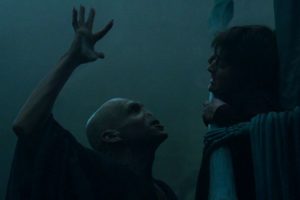 There’s also a way to view a person’s memories, introduced in this book. And yet, no one suggests trying to view Harry’s memories after his escape from Voldemort. The proof that the Dark Lord was back, as well as the names and faces of some of the most important Death Eaters, was right in front of them … and yet they do nothing. Dumbledore never even seems to suggest that Harry’s memories should be examined. It is an oversight that put the Wizarding World in extreme danger.
There’s also a way to view a person’s memories, introduced in this book. And yet, no one suggests trying to view Harry’s memories after his escape from Voldemort. The proof that the Dark Lord was back, as well as the names and faces of some of the most important Death Eaters, was right in front of them … and yet they do nothing. Dumbledore never even seems to suggest that Harry’s memories should be examined. It is an oversight that put the Wizarding World in extreme danger.
Harry is also strikingly incurious, as I have said again. He still doesn’t do any real research, even though he’s been plunged into danger (although he does spend a lot of time learning new spells). I remain exasperated that he never really grew up.
But those problems can be overlooked, because – on the whole – Goblet of Fire is a very strong book. It marks the first true shift from childish storytelling to the more adult tone that would dominate the remainder of the series. It also showcases just how easy it is for people to close their eyes and ears to evil, particularly when they don’t want to believe that it exists.
It is a shame, in many ways, that the series would start to decline from this point on.

I think this one is the worst for plot holes.
I would put seven up for that title. 😉
I rather liked this one, but I admit the flaws.